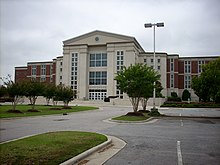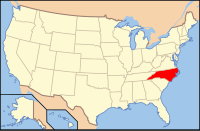Harnett County
| Harnett County, North Carolina | |
|---|---|

Harnett County Courthouse
|
|
 Location in the U.S. state of North Carolina |
|
 North Carolina's location in the U.S. |
|
| Founded | 1855 |
| Named for | Cornelius Harnett |
| Seat | Lillington |
| Largest city | Dunn |
| Area | |
| • Total | 601 sq mi (1,557 km2) |
| • Land | 595 sq mi (1,541 km2) |
| • Water | 6.3 sq mi (16 km2), 1.1% |
| Population (est.) | |
| • (2014) | 126,666 |
| • Density | 212.8/sq mi (82/km²) |
| Congressional district | 2nd |
| Time zone | Eastern: UTC-5/-4 |
| Website | www |
Harnett County is a county located in the U.S. state of North Carolina. As of the 2010 census, the population was 114,678. Its county seat is Lillington, and its largest city is Dunn.
Harnett County comprises the Dunn, NC Micropolitan Statistical Area, which is a part of the greater Raleigh-Durham-Chapel Hill, NC Combined Statistical Area, which had a 2013 estimated population of 2,037,430.
Harnett County was formed in 1855 from land given by Cumberland County. It was named for American Revolutionary war soldier Cornelius Harnett, who was also a delegate to the Continental Congress. The first settlers came to the region in the mid-1720s, and were followed by Highland Scots immigrants. The Scots settled in the foothills, where land was more affordable, rather than in the rich alluvial soil area of the coastal plain. After the defeat by the British of Bonny Prince Charles at Culloden, Scots immigrants came up the Cape Fear River in ever increasing numbers and settled in western Harnett County. British immigrants had settled primarily along the banks of the Cape Fear River in the coastal area, generally from Erwin to Wilmington.
...
Wikipedia
